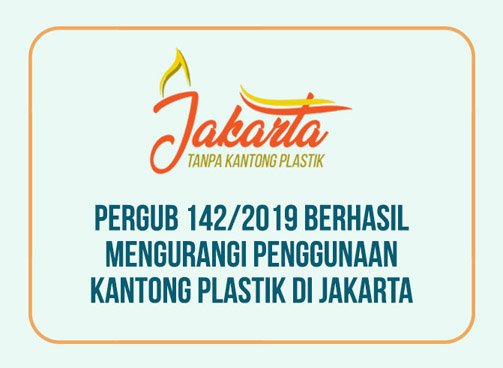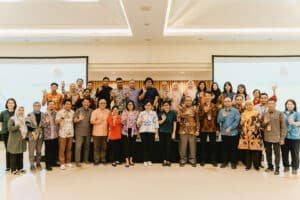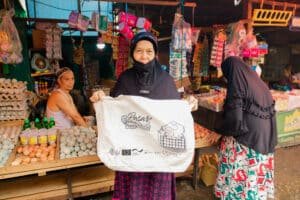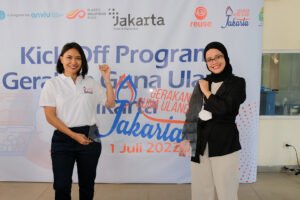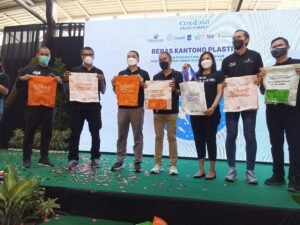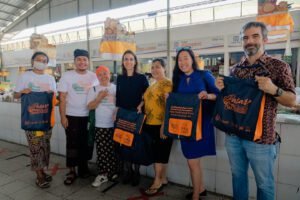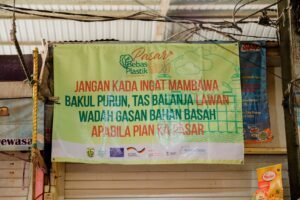In an effort to create a Plastic Bag Free Indonesia, the DKI Jakarta Provincial Government has issued DKI Jakarta Provincial Governor Regulation No. 142 of 2019 concerning the Obligation to Use Environmentally Friendly Shopping Bags. This regulation came into effect on July 1 2020. Even during the Covid-19 pandemic, the actions of the DKI Jakarta Provincial Government show that efforts to protect the environment have not stopped. Exactly one year after its implementation, the DKI Jakarta Provincial Environmental Service reported a reduction in plastic shopping bags, both at the business and household level.
Monitoring research on the implementation of regulations was carried out by the DKI Jakarta Provincial Environmental Service together with the Indonesian Plastic Bag Diet Movement (GIDKP). Research was carried out quantitatively through field surveys and qualitatively through focused group discussions.
A quantitative survey was conducted on 1,220 heads of families (KK) distributed proportionally in five administrative cities of DKI Jakarta Province. Seribu Islands Jakarta is not included in this calculation because the proportion is very small. This survey obtained quantitative data on the use of plastic bags after Governor Regulation 142/2019, which includes routine shopping locations, non-routine shopping locations, use of plastic bags at each location, as well as the level of use of reusable shopping bags in each household. To calculate the reduction achieved, we compared baseline data in 2018 with data from monitoring and evaluation results in 2020. Both baseline and monitoring and evaluation data were taken from sampling research at the head of family level. The reduction amount for each respondent is then averaged to obtain the final reduction percentage figure. Sampling was carried out randomly (probability sampling) using a multistage random sampling method. The margin of error for this research is +/- 2.83% at a 95% confidence level.
There has been a 42% reduction in average plastic bag use at household level since the regulation was promulgated. This is equivalent to a reduction in waste generation from 11,191.99 tonnes before the regulation was implemented to 6,452 tonnes of plastic bags or a reduction of 4,739.99 tonnes per year. Since it was published in December 2019, and took effect in July 2020, until June 2021, the successful reduction in single-use plastic consumption is estimated to reach 9,479.97 tonnes.
A comparison of the results of single-use plastic use before and after the issuance of the regulations is as follows:

If you only look at shopping locations regulated by Gubernatorial Regulation 142/2019, there is an average 82% reduction in the use of plastic bags in places where it is mandatory to limit them, namely shopping centers, supermarkets and people’s markets. The three regulated locations have varying levels of compliance. Supermarkets are approaching 100% reduction in plastic bags, shopping centers are reaching 95%, while people’s markets are reaching 50%.
The difference in the level of plastic bag reduction is measured from quantitative surveys (such as from respondents who said they never use plastic bags in supermarkets, but still use them in traditional markets) and confirmed by qualitative data (such as from observations of consumers who said they saw plastic bags most often still on the market). The survey also measured an increase in the use of reusable shopping bags to 95%, with the most preferred type of reusable shopping bag being cloth bags (77.05%) because they are easy to fold and wash, rather than cardboard (5.98%) or woven baskets (4.34%).
Apart from quantitative calculations, a qualitative method for monitoring the implementation of PerGub 142/2019 is conducting focused group discussions. Participants in this discussion included the Indonesian Retail Entrepreneurs Association, Perumda Pasar Jaya, community groups such as the Indonesian Zero Waste Alliance, Nexus 3, Divers Clean Action, EcoNusa, WALHI, and Kopernik, as well as local government elements such as the City Administrative Environmental Service and representatives from several sub-districts in DKI Jakarta Province. The discussion captured the experiences of business actors, the community and the government who had conducted field observations at shopping centers, modern shops and people’s markets, as well as the successes or challenges of implementing Gubernatorial Regulation 142/2019 in these three locations.


“Pergub 142/2019 is also one of DKI Jakarta’s efforts which aims to reduce plastic waste by encouraging community participation in being able to bring their own Environmentally Friendly Shopping Bags (KBRL) from home when shopping at the 3 regulated subjects, namely shopping centers, supermarkets , and people’s markets, as well as educating the public about plastic waste and its impact on the environment,” explained Rita Ningsih, Head of the DKI Jakarta Province DLH Waste Management Section.
It is hoped that this Governor’s Regulation can be an example to encourage other regions in Indonesia to be more enthusiastic about implementing regulations limiting single-use plastics in order to create a plastic waste-free Indonesia.
“We hope that more and more regions in Indonesia will have regulations limiting single-use plastics in an effort to achieve the waste reduction target of 30% by 2025. “Apart from that, the Regional Government needs to work harder to ensure that traditional markets also reduce plastic bags significantly,” added Tiza.
Based on data released by the Ministry of Environment and Forestry, in 2021 in Indonesia there will be 2 provinces, 28 cities and 26 districts that will have regulations limiting single-use plastic. Apart from DKI Jakarta, GIDKP has also monitored Bali’s achievements in reducing single-use plastic.

